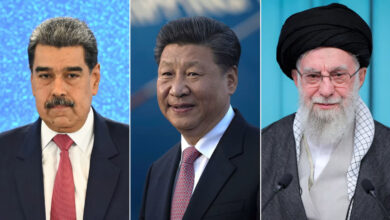State-owned newspapers lead off front-page news with alarming signs of the friendly Lebanese welcome to Iranian President Mahmoud Ahmadinejad in Beirut Wednesday.
In its headline, state owned Rose al-Youssef–which usually takes a harsh stance against Tehran and its Arab allies–runs a headline reading: "When Beirut turned to be a a Shiite Emirate."
Rose al-Youssef says "Ahmadinejad's visit to Lebanon seems that it is a visit to the Shiites–not a state visit." The paper then elaborates on negative reactions from the US and different local political actors.
The White House on Wednesday accused Ahmadinejad of using his visit to Lebanon to continue his "provocative ways…even as he leaves his country further in economic distress and turmoil as a result of his actions," said White House spokesman Robert Gibbs.
State-owned Al-Ahram argues that Ahmadinejad's first official state visit to Lebanon caused "a Shiite greeting, a Sunni reservation and a Christian resentment." The paper, through its correspondent in Beirut, begins its news story with the petition signed by 250 Lebanese activists requesting Ahmadinejad not use his visit to intervene in the Lebanese domestic affairs.
State-owned Al-Gomhorriya refrains from covering Ahmadinejad's visit in the news sections, instead its editor-in-chief Mohammed Ali Ibrahim writes an editorial entitled "A visit to divide a country!", where he points out that Ahmadinejad is visiting two countries at the same time–both Lebanon and the Hezbollah state within the Lebanese state.
According to Ibrahim, the visit caused fears of repeating the same internal political crisis in Lebanon which lasted for three years from 2006 to 2009.
The key for Lebanon peace, argues Ibrahim, is to respect the Lebanese state not the parallel state of Hezbollah.
Egypt and Iran have not had full diplomatic ties since the Iranian Islamic revolution in 1979.
In other news, state-owned newspapers are still occupied by last Saturday's Arab summit in the Libyan city of Sirte with 15 Arab leaders in attendance.
Journalist Abdel Mohsen Salama of Al-Ahram speaks indirectly about the disputes at the summit.
Salama argues that Libyan leader Muammar Gadhafi's objective to transform the name of the Arab league to the "Arab Union" to enhance unity among the Arab countries, is not a realistic approach.
Salama confirms that the Egyptian approach, heralded by president Hosni Mubrark, is the most realistic one since it adopts an institutional method to enhance Arab-Arab cooperation.
In other news, the upcoming parliamentary elections dominate the pages of today's newspapers.
State-owned newspapers celebrate remarks made by James A. Bever, USAID's new director in Egypt, who declared on Wednesday his agency will "support civilian organizations in providing local, not foreign, observers."
Al-Ahram reads Bever's remarks as an indicator that the US will not fund any foreign observers in order to monitor the Egyptian elections.
State owned Al-Akhbar chooses to allocate its main headlines to governmental measures taken to control the soaring prices of the basic commodities–of particular importance in light of upcoming parliamentary elections.
The paper quotes cabinet spokesperson Hamid Rady as saying that the government has taken quick measures to increase imports in order to compensate for the lack of meat in the market.
Al-Ahram, however, features other coverage dealing with the upcoming elections by shedding light on "villages that desert the poverty."
The paper says the project aimed at developing the poorest villages in Egypt is grasping the attention of President Mubarak's son Gamal.
The paper quotes Ahmed al-Maghraby, Minister of Housing, Utilities and Urban Development, as saying the first phase of the project started in 2008 with a total cost of 4.6 billion pounds. The project covers 151 villages in 6 governorates, according to the reporting.
In another coverages related to the approaching parliamentary poll, Al-Wafd newspaper, published by the liberal Wafd Party is the only newspaper to allocate a whole page in remembrance to the 1906 birth of Hassan al-Banna, founder of the Muslim Brotherhood.
Al-Banna was, according to the paper, an opportunistic political figure who used to stand close to the tyranny and despotism in order to achieve his own aspirations.
The paper cites al-Banna's support for dictator King Farouck as an example of opportunistic policy. He opposed democracy, political pluralism and the secular concept of "nationalism", according to the coverage.
In another news, Rose al-Youssef writes in its front page a headline that reads "Denmark repeats its apologies for the offensive cartoons."
Denmark's foreign minister Lene Espersen repeated an apology to the Grand Imam of Al-Azhar Sheikh Ahmed al-Tayeb for damages caused by lampooning the Prophet Mohammed.
The drawings, also know as the Danish Cartoons, were published in the Danish newspaper Jyllands-Posten in 2005 and sparked massive protests against Copenhagen.
The minister said "many people living in the Muslim world felt deeply hurt by cartoons that were in Denmark some years ago. I would just like to make it clear that this was something we found very regrettable and didn't wish to see it repeated."
The paper quotes from the Grand Imam of Al-Azhar as saying "we have confirmed that what happened was an individual action and the people and government of Denmark are against it and do not accept it."
However, this reconcilatory approach between Islam and the West doesn't resonate positively in Al-Gomhorriya which features a story in which the writer argues "Europe doesn't want the Islamic presence even if it committed to the laws."
The paper quotes Al-Azhar scholar Mohamed Mokhtar al-Mahdy as saying that the relationships between Islam and the West is deteriorating because of the systematic incidents of aggression towards Muslims and Islam.
Islamic scholar Mohamed Shoker goes further in telling the newspaper that the West is "living a state of an intellectual schizophrenia" since the West is speaking about democracy and human rights but it doesn't apply those norms to Muslim communities.
In other news, state-owned Sabah al-kheir bravely allocates a section to discussing a new alarming phenomenon where prospective grooms ask the families of prospective brides to bring a medical certificate proving the girl is virgin.
Virgninty is a major taboo in Egypt where cultural norms dictate a female shouldn't be involved in sexual affairs before marriage.
Every year, Egypt witnesses cases of honor crimes, where a male murders his female relative over suspicions of her promiscuity.
The magazine investigates the opinions of mothers. Some of them agree that the male has marry a girl "without past"–considered pre-marital sex or even dating.
In response, some mothers cunningly request proof that the male is also a virgin.
Egypt's papers:
Al-Ahram: Daily, state-run, largest distribution in Egypt
Al-Akhbar: Daily, state-run, second to Al-Ahram in institutional size
Al-Gomhorriya: Daily, state-run
Rose el-Youssef: Daily, state-run, close to the National Democratic Party's Policies Secretariat
Al-Dostour: Daily, privately owned
Al-Shorouk: Daily, privately owned
Al-Wafd: Daily, published by the liberal Wafd Party
Al-Arabi: Weekly, published by the Arab Nasserist party
Youm7: Weekly, privately owned
Sawt el-Umma: Weekly, privately owned




